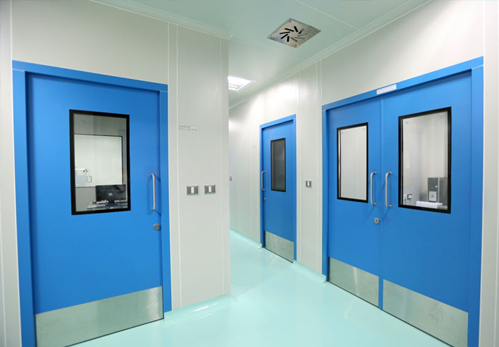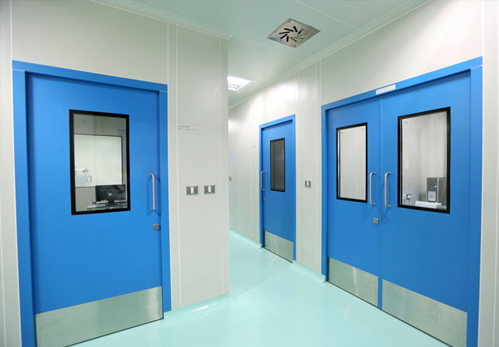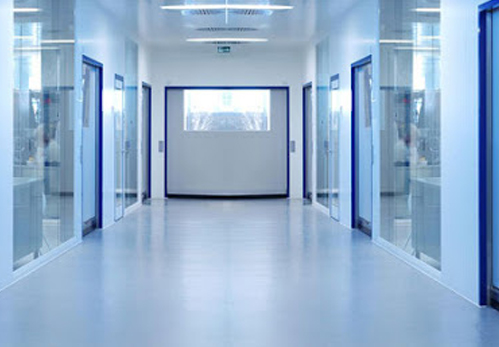A cleanroom is a confined space where contaminants, pollutants, and airborne particulates are maintained at strictly low levels. It is a controlled environment typically used in scientific research or manufacturing and in the production of food and beverages. Cleanrooms are utilised by many industries as ultra-clean, self-contained environments which ensure controlled levels of pollutants and pathogens such as chemical vapours, aerosol particles, and microorganisms.
Industries from electronic engineering to pharmaceuticals depend on cleanrooms to maintain a stable environment in which manufacturing and testing could be compromised by even the smallest particles. For soft drinks, cleanrooms help to maintain industry standards by reducing pollutant contamination.
Saakvee cleanrooms have a proven record of reliability, quality, and industry experience. We are able to offer the most competitive prices and high quality cleanrooms because we manage the project from design to installation.

Modular Cleanroom Benefits
- Modular Construction
- Quick Assembly Time
- Versatility
- Reconfiguration
- Airflow Control
- Inexpensive Modifications
Contamination Control For Soft Drinks
Ensuring that the air within your soft drink manufacturing plant is pollutant free is of prime concern, which is why HEPA filters are utilised. For industries requiring more filtration, ULPA filters are installed. Our ultra-low particulate air (ULPA) filters are tested to 99.9995 percent on 0.12 micron efficiency while our high-efficiency particulate air (HEPA) filters are tested to 99.99 percent on 0.3 micron efficacy. This creates a positive pressure and clean air environment.

At Saakvee, our modular cleanroom concept is proven in soft drink manufacturing with enclosures designed around each application. Units are portable and expandable and are easy to assemble. Our cleanroom technology is available for small, localised areas to larger cells that can be linked together. The enclosures come with soft wall or rigid panels, HEPA filters and variable atmosphere controls.
The HEPA filter offers efficient particulate filtration through the enclosure on a repeated basis while a laminar airflow directs any airborne particulates away from the production or packaging area where product or pack could become contaminated. Saakvee offers a range of Aerosol Particle Counters for Particle Monitoring, with sensitivities from 0.1 µm and flow rates up to 100 litres/minute. We can assist in determining the best tool for your soft drink plant. We offer routine monitoring of cleanrooms for Airborne Particles according to ISO 14644-2, troubleshooting activities, certification of HEPA filters in cleanrooms and laminar flow benches per ISO 14644-1.
Our range of particle counters extend to liquid particle counting. This offers a wide range of instrumentation for monitoring particles in liquids such as soft drinks, chemical monitoring and parental sampling. Our remote and portable particle counters for air and gas are specifically designed for cleanroom environments and our Particle Measuring Systems technology is manufactured to exceed or meet industry standards and requirements. They provide comprehensive data and accurate results for all users.
Cleanroom Design, Build & Validation
- Budgeting and planning
- Engineering, design & layout
- Airflow and filtration design
- Construction and Installation
- Full Certification of our product
- Industry-specific equipment installation
- Validation
How Our Soft Drink Cleanroom Works
Cleanrooms can contain whole manufacturing plants with factory floors spanning thousands of square metres. They are largely used in food and beverages manufacturing industries, and other fields that have high sensitivity to environmental contamination. There are also cleanrooms of modular designs that can be relocated or extended to fit specific conditions.
Ultra-low particulate air (ULPA) and/or high-efficiency particulate air (HEPA) filters are used to constantly recirculate the air inside a cleanroom, with external air which is introduced into the room also going through a filtering process to remove dust.
The level of particles in cleanrooms is normally tested using a particle counter while certain environmental methods are used for counting and detecting microorganisms. Positive pressure is maintained in our soft drink cleanrooms so that air will be passed out of the chamber rather than into it if any leaks occur. Particle counters for air and gas are crucial for the cleanroom industry. Our team manufactures technology that counts the number of particles in the air, and then calculates their results accordingly. By doing so, we measure the cleanliness levels of cleanroom and controlled environments for sensitivity and contamination analysis.

PPC (particles per cubic metre) is a measurement of the level of pollutant contamination within the environment, and cleanrooms are designed to maintain an acceptable level of contamination. The cleanliness level of cleanrooms is quantified at a predetermined measure of molecule per cubic metre. For instance, at 35,000,000 PPC (of particles 0.5mm or larger) ISO grade 9 is the lowest level of cleanroom available, and has an atmosphere comparable to an urban environment.
There are 35,000,000 particles present per cubic metre in the ambient outdoor air of a typical city environment in the size area of 0.5 micron and bigger in diameter, comparable to an ISO 9 cleanroom. In contrast, there are no particles allowed in that size range in an ISO 1 cleanroom whereas in a range of 0.3 and smaller, there are only 12 particles per cubic size.
Modular Cleanroom Services
- Design & Build
- Free Site Survey
- Free Design Service
- Cleanroom Planning
- Construction and Installation
- CNC Engineered
- Training & Support
- Discounted Service Contracts
- Remedial Works
- Panel Repairs
- Alternations
- BMS Management
- Cleanroom Certification
- Differential Pressure Qualification
- Servicing Testing Validation
- Smoke Testing
- DOP Testing
Soft Drinks Personnel And Cleanrooms
People working in a cleanroom environment leave and enter through airlocks that may typically involve an air shower stage. Access to cleanrooms is limited to personnel wearing cleanroom Personal Protective Equipment. They are clothed in protective gear such as gloves, face masks, hoods, coveralls and boots. There may not be air showers in cleanrooms with less rigorous air contamination standards but an anteroom, also referred to as “gray room”, is a place where clean-room suits are worn. Only special shoes, with entirely smooth soles are required in low-level cleanrooms because they do not track in dirt or dust. But, for safety reasons, these shoe soles must not create a slipping hazard.
Contamination control theory courses are required for all soft drinks personnel before working within a cleanroom. Airlocks, as well as specialised clothing and gowning procedures help keep particulate contamination to a minimum, and maintain a high level of cleanliness in the cleanroom. ISO grade will determine what soft drink personnel need to wear in order to minimise contamination when working within the cleanroom. This can include anything from standard lab coats to fully enclosed jumpsuits.
Soft drink cleanroom attire is fairly standard and includes bouffant caps, beard covers, shoes, face masks, boots, frocks, gowns, aprons, gloves, hoods and shoe covers. Soft drink personnel will need to dress in accordance with the ISO grade of the portable cleanroom and the specific job being performed.
Cleanroom Features
- GMP
- ISO 4-9
- ISO 14644
- Low Power Consumption
- Environmentally Friendly
- HEPA Filters
- Air Filtration
- Fan Filter Units
- Cleanroom Ceiling System
- Temperature Control
- Access Control
- Inter Lock Door Systems
- Air Showers
- Unidirectional Airflow
- Desiccator Cabinets
- Horizontal Flow Wall Modules
- Horizontal Laminar Flow Clean Benches
- Laminar flow cabinets
- Laminar Flow Canopy
Air Flow Principles In Soft Drink Cleanrooms
Uncontaminated air is maintained in cleanrooms through the use of ULPA or HEPA filters adopting the turbulent or laminar air flow principles. In laminar (unidirectional) air flow systems, the filtered air is directed downwards in a constant stream going through perforated raised floor panels in order to be recirculated. To maintain uninterrupted air processes, 80 to 100% of soft drink cleanroom ceilings employ laminar air processing.
Turbulent (non-unidirectional) air flow systems keep air in motion, though not in the same direction, by employing both nonspecific velocity filters and laminar air flow hoods.
A standard soft drink cleanroom design covers the whole air distribution system. This includes provisions for suitable downstream air returns, and this means employing low wall air returns for vertical rooms in the perimeter of the zone. In horizontal flow systems, however, the downstream boundary of the air flow process requires the use of air returns. Using ceiling-mounted air returns contradicts a standard cleanroom design.
Benefits Of Soft Drink Cleanrooms
Because of the controlled environment made possible by cleanroom technology, soft drink manufacturers can now undertake phases of production under localised cleanroom conditions, reducing the risk of airborne contamination of products and any resultant degradation of flavour, colour or a potential detrimental effect on shelf life.
By preventing airborne microorganisms coming into contact with the warm soft drink, packaging and measuring and dosing equipment, manufacturers can help protect products and increase shelf life thereby reducing the levels of preservatives in soft drinks.
Controlled environments such as the one we offer at Saakvee eliminate the need for the whole of the production plant to be contained within a purpose-built cleanroom, and thereby significantly reduce costs for soft drink manufacturers of all sizes.
Cleanroom Industries/Sectors
Saakvee For A Guaranteed Secure Environment For Your Critical Processes
At saakvee, your contamination control requirements are our priority. At your request, our experienced CTCB certified engineers and ISO classified controlled environments can be provided to your soft drink plant to protect critical processes and add value to your operations.
Your cleanroom is necessary for the protection of your critical processes and environments and to ensure your beverage meets the hygiene standards required. We can help ensure this by providing pneumatic filter installation and maintenance that guarantees filter integrity and efficiency. Our services are ISO 14001, ISO 9001 and OHSAS 18001 accredited..
